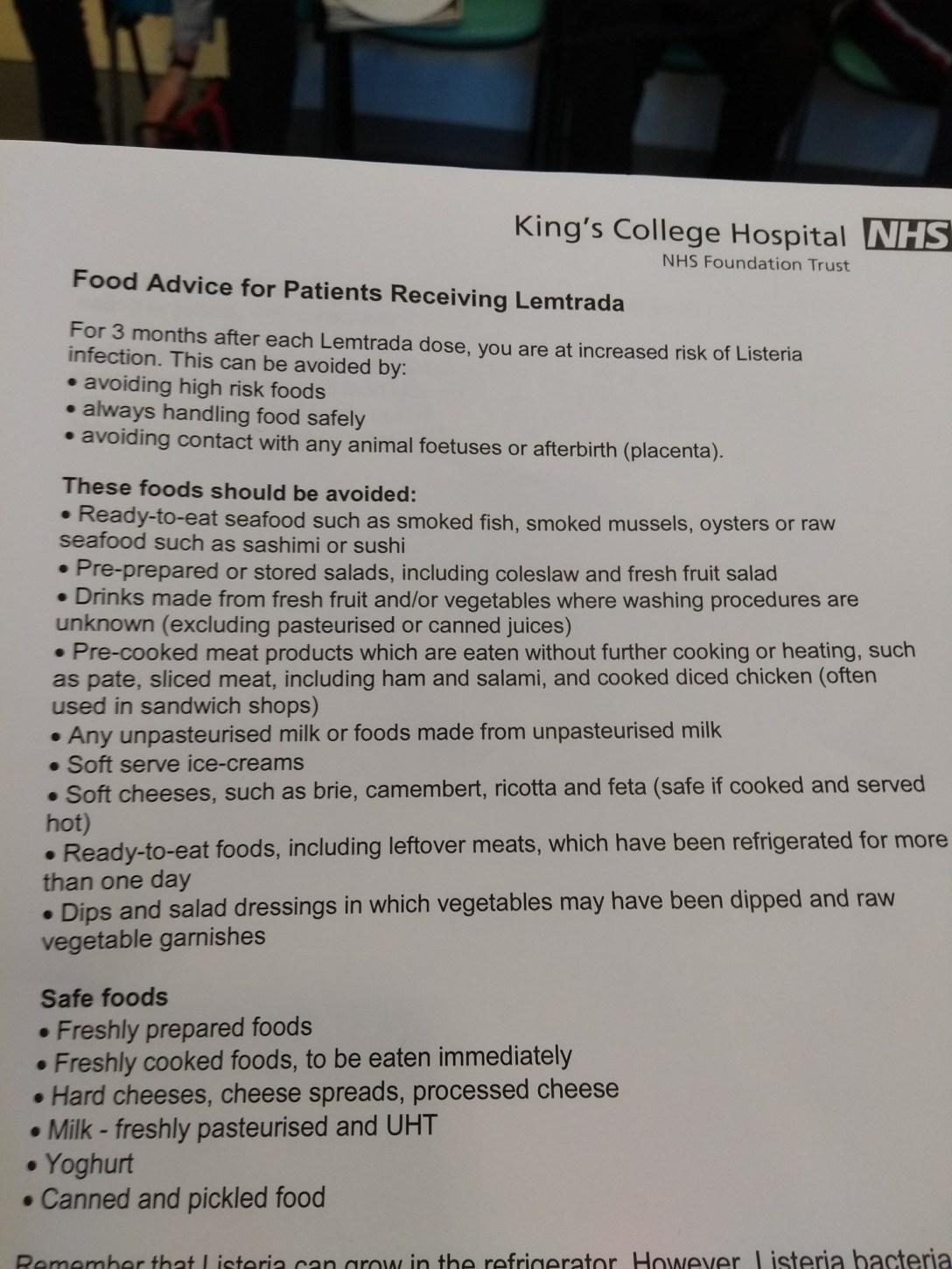In my time waiting for Lemtrada (alemtuzumab) treatment, I’ve been part of a very useful Facebook group with members who have had, or are having, or are thinking about having Lemtrada. It’s a great place to get support and advice about a drug which has many possible side-effects and treatment regimens that differ wildly from one hospital to the next.
One aspect of the treatment that is common to all the places where it is given is the need to follow a special diet before and after treatment (though hospitals vary in terms of the length of time they like their patients to stay on it).
Lemtrada works by killing off white blood cells (lymphocytes) which attack the nervous system in people with MS. The white blood cells that then grow back do not seem to attack the nervous system, and so the drug can halt relapses and slow down progression of the disease. As the white blood cells are an important part of the immune system, people who have had Lemtrada are at greater risk of infection, and the most dangerous of these is listeria, a food-borne bacteria which can cause death.
When you have Lemtrada treatment, you need to follow a diet that minimises your risk of contracting listeria, and in the Facebook group that I’m part of one of the most common topics under discussion is this diet and what you are/are not allowed to eat while following it. I was on the diet for a year because I was asked to follow it for three months before treatment, and never knew whether the treatment might happen within the next three months: I ended up waiting for treatment for nine months. The hospital where I was treated also advise following the diet for three months after treatment. In that time, I had to do a lot of research into the kinds of foods I could eat, as although the hospital gave me a list of permitted and restricted foods it wasn’t exhaustive and I wasn’t always sure whether what I wanted to eat was allowed. What I came to realise is that there are a set of very simple rules that show what you can and can’t eat. And perhaps the most important thing to know is that listeria bacteria are easily killed off by heat, so there’s no risk from food that has been properly heated until it’s piping hot all the way through.
These are the rules I followed:
- DON’T EAT anything from the chiller cabinet in the supermarket, EXCEPT hard cheese and (non-live) yogurt, unless it has been heated until it is piping hot. This includes ready-mixed salad leaves sold in bags.
- DON’T EAT anything from the freezer in the supermarket, EXCEPT ice-cream, unless it has been heated until it is piping hot
- DO EAT anything that is stored on the shelves of the supermarket – ie at room temperature (that includes anything in a jar or tin)
- DO EAT raw fresh fruit and vegetables as long as they have been washed
The main issue with following the diet, in my experience, is getting food when you’re out. Pre-made sandwiches are forbidden, as are pre-packed salads. Many times I’ve lunched on a packet of crisps because nothing else was available. When you’re on the diet you do need to plan ahead and carry food with you if you know you might not be able to get anything suitable. Sandwiches and salads that you’ve made yourself are fine to eat, you just need to ensure these don’t contain cured meat or ham, bought cooked chicken, hummus or other dips, smoked fish, or soft cheese. All salad items need to be washed well.
I’m aware some people don’t eat takeaways or in restaurants while on the listeria diet, but I didn’t worry too much about this. On the rare occasions I had a takeaway I heated it in the microwave to make sure it was especially hot, and in restaurants I chose my food carefully – no rare steak, no shellfish – and made sure it was properly cooked through before eating it. I left any salad garnishes untouched.
Although the diet was daunting at first, it became quite easy to follow once I realised that the rules about what you can and can’t eat boil down to something quite simple.

[…] The listeria diet […]
LikeLike
[…] The listeria diet […]
LikeLike
[…] The listeria diet […]
LikeLike
[…] The listeria diet […]
LikeLike
[…] The listeria diet […]
LikeLike
[…] The listeria diet […]
LikeLike
[…] The listeria diet […]
LikeLike
[…] The listeria diet […]
LikeLike
[…] The listeria diet […]
LikeLike
[…] The listeria diet […]
LikeLike
[…] The listeria diet […]
LikeLike